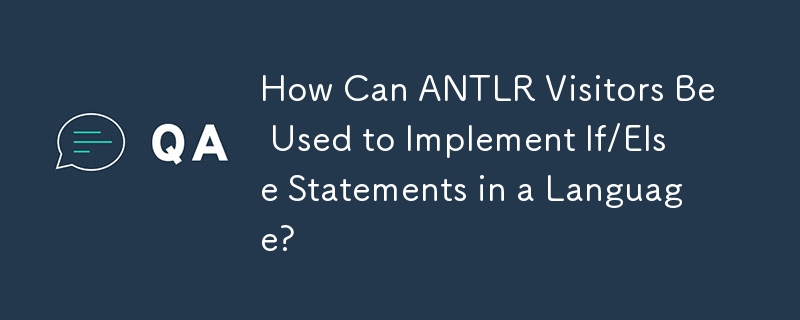 Java
Java
 javaTutorial
javaTutorial
 How Can ANTLR Visitors Be Used to Implement If/Else Statements in a Language?
How Can ANTLR Visitors Be Used to Implement If/Else Statements in a Language?
How Can ANTLR Visitors Be Used to Implement If/Else Statements in a Language?

If/else Statements with ANTLR Listener Pattern
By default, ANTLR 4 generates listeners. If you specify the -visitor command line parameter to the org.antlr.v4.Tool, ANTLR will also generate visitor classes. Visitors offer more control over parsing the parse tree because they allow you to choose which subtrees to traverse. This distinction is particularly valuable when you're aiming to exclude specific subtrees, such as if/else blocks. While listeners could technically accommodate this task, it's much cleaner to use a visitor.
Here are the key steps to implement if/else statements using ANTLR and the visitor pattern:
- Generate the grammar
- Create visitor class extending MuBaseVisitor
- Override visitIf_stat in the visitor class
- Implement the actual if/else logic in visitIf_stat
For a concrete example, here's an implementation of an EvalVisitor class that can evaluate if/else statements in Mu language:
<code class="java">public class EvalVisitor extends MuBaseVisitor<Value> {
// ...
@Override
public Value visitIf_stat(MuParser.If_statContext ctx) {
List<MuParser.Condition_blockContext> conditions = ctx.condition_block();
boolean evaluatedBlock = false;
for (MuParser.Condition_blockContext condition : conditions) {
Value evaluated = this.visit(condition.expr());
if (evaluated.asBoolean()) {
evaluatedBlock = true;
// evaluate this block whose expr==true
this.visit(condition.stat_block());
break;
}
}
if (!evaluatedBlock && ctx.stat_block() != null) {
// evaluate the else-stat_block (if present == not null)
this.visit(ctx.stat_block());
}
return Value.VOID;
}
}</code>With this implementation, you can parse Mu input containing if/else statements, evaluate the conditions, and execute the appropriate block of code.
The above is the detailed content of How Can ANTLR Visitors Be Used to Implement If/Else Statements in a Language?. For more information, please follow other related articles on the PHP Chinese website!

Hot AI Tools

Undresser.AI Undress
AI-powered app for creating realistic nude photos

AI Clothes Remover
Online AI tool for removing clothes from photos.

Undress AI Tool
Undress images for free

Clothoff.io
AI clothes remover

Video Face Swap
Swap faces in any video effortlessly with our completely free AI face swap tool!

Hot Article

Hot Tools

Notepad++7.3.1
Easy-to-use and free code editor

SublimeText3 Chinese version
Chinese version, very easy to use

Zend Studio 13.0.1
Powerful PHP integrated development environment

Dreamweaver CS6
Visual web development tools

SublimeText3 Mac version
God-level code editing software (SublimeText3)

Hot Topics
 1664
1664
 14
14
 1423
1423
 52
52
 1317
1317
 25
25
 1268
1268
 29
29
 1242
1242
 24
24
 Is the company's security software causing the application to fail to run? How to troubleshoot and solve it?
Apr 19, 2025 pm 04:51 PM
Is the company's security software causing the application to fail to run? How to troubleshoot and solve it?
Apr 19, 2025 pm 04:51 PM
Troubleshooting and solutions to the company's security software that causes some applications to not function properly. Many companies will deploy security software in order to ensure internal network security. ...
 How do I convert names to numbers to implement sorting and maintain consistency in groups?
Apr 19, 2025 pm 11:30 PM
How do I convert names to numbers to implement sorting and maintain consistency in groups?
Apr 19, 2025 pm 11:30 PM
Solutions to convert names to numbers to implement sorting In many application scenarios, users may need to sort in groups, especially in one...
 How to simplify field mapping issues in system docking using MapStruct?
Apr 19, 2025 pm 06:21 PM
How to simplify field mapping issues in system docking using MapStruct?
Apr 19, 2025 pm 06:21 PM
Field mapping processing in system docking often encounters a difficult problem when performing system docking: how to effectively map the interface fields of system A...
 How does IntelliJ IDEA identify the port number of a Spring Boot project without outputting a log?
Apr 19, 2025 pm 11:45 PM
How does IntelliJ IDEA identify the port number of a Spring Boot project without outputting a log?
Apr 19, 2025 pm 11:45 PM
Start Spring using IntelliJIDEAUltimate version...
 How to elegantly obtain entity class variable names to build database query conditions?
Apr 19, 2025 pm 11:42 PM
How to elegantly obtain entity class variable names to build database query conditions?
Apr 19, 2025 pm 11:42 PM
When using MyBatis-Plus or other ORM frameworks for database operations, it is often necessary to construct query conditions based on the attribute name of the entity class. If you manually every time...
 How to safely convert Java objects to arrays?
Apr 19, 2025 pm 11:33 PM
How to safely convert Java objects to arrays?
Apr 19, 2025 pm 11:33 PM
Conversion of Java Objects and Arrays: In-depth discussion of the risks and correct methods of cast type conversion Many Java beginners will encounter the conversion of an object into an array...
 How to use the Redis cache solution to efficiently realize the requirements of product ranking list?
Apr 19, 2025 pm 11:36 PM
How to use the Redis cache solution to efficiently realize the requirements of product ranking list?
Apr 19, 2025 pm 11:36 PM
How does the Redis caching solution realize the requirements of product ranking list? During the development process, we often need to deal with the requirements of rankings, such as displaying a...
 E-commerce platform SKU and SPU database design: How to take into account both user-defined attributes and attributeless products?
Apr 19, 2025 pm 11:27 PM
E-commerce platform SKU and SPU database design: How to take into account both user-defined attributes and attributeless products?
Apr 19, 2025 pm 11:27 PM
Detailed explanation of the design of SKU and SPU tables on e-commerce platforms This article will discuss the database design issues of SKU and SPU in e-commerce platforms, especially how to deal with user-defined sales...



